previously thewritingcafe Hello! Welcome to a blog full of writing resources and advice. If the ask box link does not work, it is closed. Do not send in questions. Please check the FAQ, ask policy, and the tags page before asking a question. Thank you! When asking time-sensitive questions, please keep in mind that days could pass before I see your question.Some of the material on this blog may not be suitable for those under the age of 18. Warning: There may be graphic images in the injuries, gore, torture, death, and forensics tags. Disclaimer: This blog is run by an American. A lot of the material is written from American perspectives. When it comes to social topics, such as race or sexual orientation, a lot of the material might not be helpful for non-American writers. However, much of the information on the publishing industry can extend to other English-speaking countries.
Don't wanna be here? Send us removal request.
Text
Blog Update/Hook Me Update
I’ve been having a lot of problems with my computer, which has slowed my replies to Hook Me submissions.
Unfortunately, I need to send in my computer to get it properly fixed. So my blog and my replies will be halted for about 2 - 3 more weeks.
Sorry!
110 notes
·
View notes
Photo
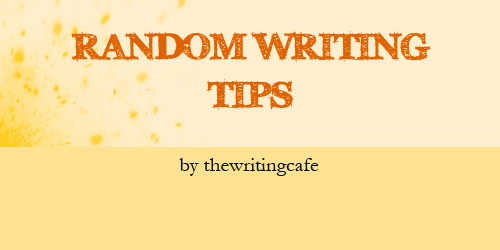
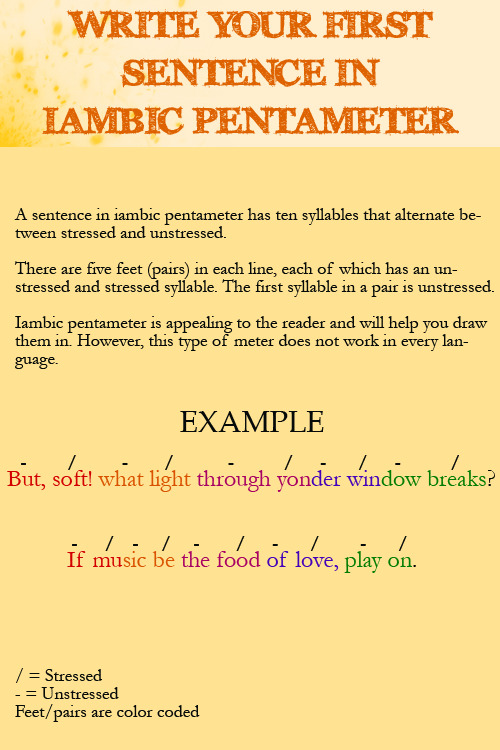
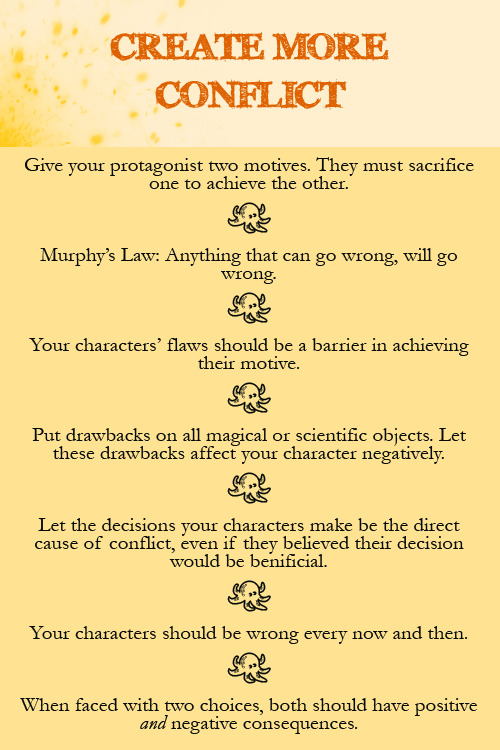
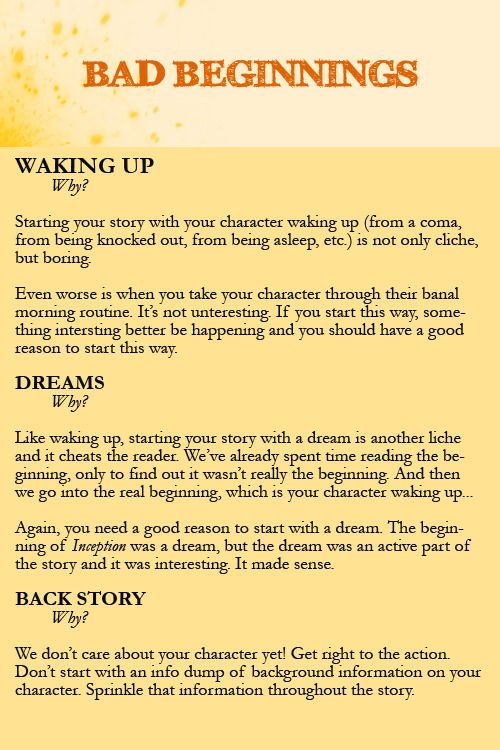
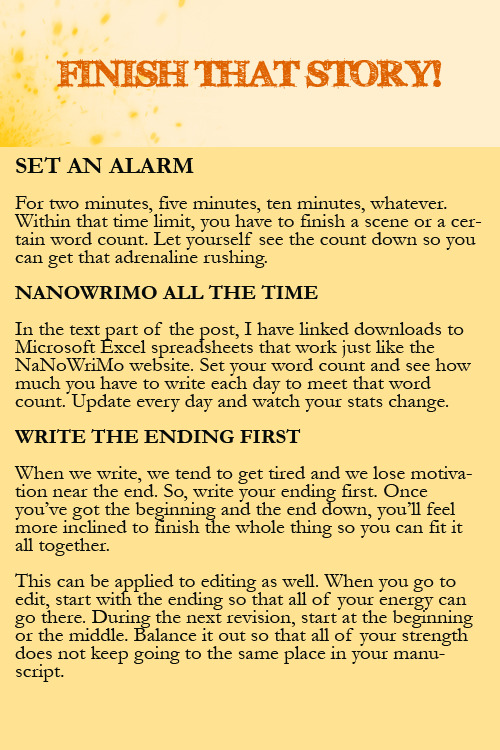
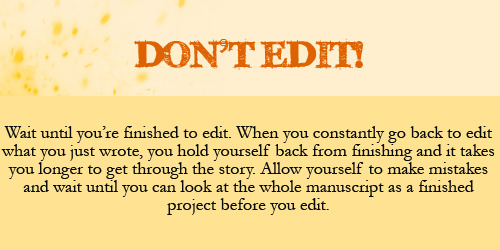
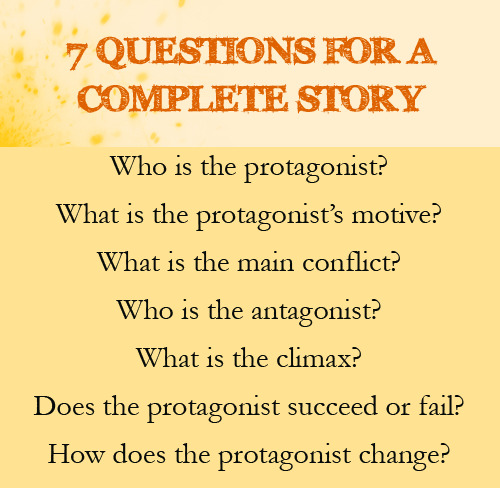
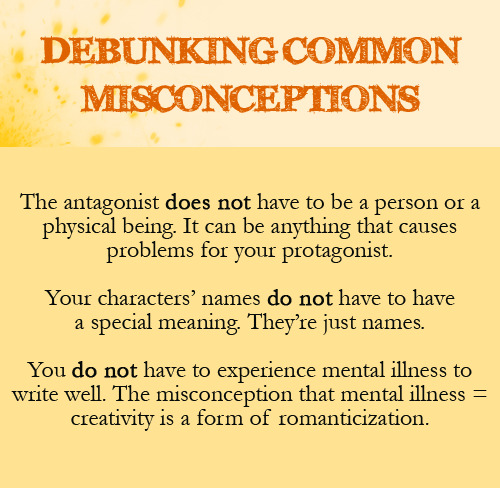
Word Tracking Spreadsheets - These sheets also have sections for character and plot information.
93K notes
·
View notes
Photo






New Releases
Teens/YA - Week of July. 26, 2016
209 notes
·
View notes
Note
One of my character dies from his body undergoing so much stress that his body shuts down. (in the story, this happens because of using too much magic, and is called Magic Sickness.) but I hardly know what kind of symptoms he would undertake and what exactly would kill him first (blood loss, suffocation, etc). Help?
Obligatory trigger warning for death mentions in the following text, and links.
Through Google, you can find articles and guides that prepare a person for the ‘signs’ that the body is close to death. Although it may seem morbid, these are good resources to look at to get an understanding of how the body ‘eases’ from life, into death. Here are a few:
Preparing for Approaching Death
10 Signs Death is Near
The Last Stages of Life
Approaching Death: Signs of Body Shut Down
As for time scale… Obviously, in the event of a severe injury or sickness that acts quickly, the signs and symptoms will happen at a more accelerated rate. Unfortunately, I lost my grandma a few months ago… and even to this day, we were left very uninformed about how to help her… as such, her death was very sudden to us, and felt avoidable.
Upon reading these resources, however, it has become clear to me now that my grandma was likely ‘dying’ for up to about a year… and we just didn’t know the signs in order to look out for them. She stopped eating a lot of months before she died, and we couldn’t understand why she wouldn’t eat, and even stopped wanting to see her own family… yet as these articles explain, a loss of appetite and social withdrawal are two very common symptoms experienced towards the end of a person’s life.
My grandma’s death was ruled as natural causes… I think it was some form of organ failure, or internal bleed. She was very frail towards the end, suffered a fall, and she died a day or so later as a result of that. In actuality, she was dealing with emphysema and heart failure, which no doubt contributed to her death, but did not cause it.
I say this because you point out that you’re unsure of what would ‘kill him first’ in regards to your character… I don’t think there is a right answer for this. It can sometimes be very circumstantial, even if there is a pre-existing condition (or conditions) - in your case, Magic Sickness.
So your character may die of a heart attack in his final stages, from the organ being put under severe stress. He may experience some kind of internal haemorrhage, if you think blood loss is more feasible given what precedes the scene in which he dies. Have a think about what he is doing before he dies, what the Magic Sickness does to the body (as this especially is something only you can know, since Magic Sickness is a made-up disease of yours…!), and then you should be able to understand from there.
I hope this helps, and best of luck~
- enlee
1K notes
·
View notes
Photo

8 mystery books to read this summer
Get your Sherlock on with these suspense novels recommended by mystery masters.
226 notes
·
View notes
Text
Prompt 1816. “Never telepathically communicate with my cat again.”
1K notes
·
View notes
Text
Hook Me: Common Problems
I recently did another round of Hook Me, an exercise I do with my followers where they send in fake query letters and I critique them.
A query letter is a short summary of your novel (a “hook”) that is used to pitch a novel to an agent or editor. Anyone who wants to get published needs to know how to write one.
So here are problems I saw in the majority, though not all, of the query letters I received.
1. My Story Is About...
Don’t use any of the following phrases in your query letter:
My story is about...
My story features...
This story is...
The main character is...
Throughout the story these characters encounter...
This story features themes such as...
This story has characters who are...
In a world where...
When writing a query letter, every word counts. Just jump right into it. Instead of starting with:
My story is about a spiteful, long-haired kitchen manager named Abbie who must track down the vampire who bit her and kill him to avoid becoming one herself.
start with:
Abbie was just bitten by a vampire. To remain human, she must track down the one that bit her and kill him before the seven-day transformation can be completed.
And let the story speak for itself. Don’t just tell me that your story features the trials of friendship or that you have three lgbt characters or that it deals with heavy themes. Show me. In the manuscript.
2. Unnecessary Character Descriptions
I don’t need to know that the main character is a red-haired spunky teenager with three piercings and freckles and a knack for math. I don’t need to know these useless details.
Only tell me what I need to know about this character. What is relevant to the plot? To their motive? One of the few descriptors that you can add that may not be entirely relevant would be the age of the main character.
3. Comparing Your Story to The Wrong Thing
Your story is not like Star Wars or Harry Potter or Twilight or The Hunger Games. Nor will your story appeal to any of those audiences.
Those audiences have millions of people. Many of those people fall outside of the initial target audiences. Many of those people don’t particularly like fantasy or sci-fi or vampires or anything like that, but when something gets as popular as the series above, it draws all kinds of people.
Don’t compare your story to some of the biggest franchises in the world. This doesn’t tell agents or editors anything about your target audience. It can also show you don’t really know your genre. If you write a sci-fi and only compare it to Star Trek and Star Wars, then it’s likely you haven’t read a lot of sci-fi.
4. Vague Blurbs
I don’t need a blurb or a vague logline. I’m not sure why you would include one. Unless you’re writing a screenplay, you really do not need one at this stage.
5. Too Much
I need the protagonist and the main conflict. That’s it. Don’t give me the back story of every major character. Don’t tell me about subplots. Don’t tell me 3/4 of the book.
And do not tell me the ending. Never tell the ending in a query. The point is to hook someone. You’re trying to get someone to read your story. You’re trying to intrigue them. Telling me the ending does not do that.
Also falling into this category is too many details. You need to learn how to cut down that background information into succinct sentences. Only give what is necessary. You shouldn’t spend a whole paragraph describing your protagonist and their world before you even mention the main conflict.
6. Too Little
In contrast with #5, some of you did not give me enough information. Or, at least, the information you gave was vague.
I need to know the plot. Describing the protagonist and the themes and some of the other characters and how their friendships might be in danger does not tell me anything. I don’t care about their relationships yet. I need to know the actual conflict.
7. Did Not Follow Directions
When writing a query letter or when submitting your writing, you have to follow directions.
If you wanted a private critique, I asked you to put “private” in the title. I didn’t say to put it in the body. I also asked you to keep your submissions open so I could reply. Few people followed these directions.
It may seem nitpicky to complain about this, but you have to follow directions when submitting something.
Some people ignore anything that ignores directions because they have a lot of submissions to get through and it’s an easy way to filter out people they don’t want a business relationship with.
Some people need certain words in the subject line so that submissions don’t end up in the spam folder or so the interns know which submissions to open.
Follow the directions. Show that you’re serious enough about writing that you took the time to read the directions.
8. Lack of Voice
Your letters need to have a strong voice. The mood and pacing needs to match the book. If you’re writing a query letter for a murder mystery, the voice should be suspenseful.
4K notes
·
View notes
Text
Writing With Color Navigation
Navigation
This searchable navigation is to provide better access to the tags via the WWC navigation whether you’re on mobile or other devices. Please note that if the hyperlinks do not work on your system, they still exist and can be accessed from a browser or by search options.
Also accessible via writingwithcolor.tumblr.com/tagged/xxx
-General
Asks *Our Answers Only*
Answered
FAQs *Read first before asking*
Guides
Commentary
Stereotypes/Tropes Navigation
General
Updates
Praise *All your kind words*
Links
Quotes
Recommendations
Series and Services
Braving Diversity *Currently on hold*
Colorful Critiques *Writer Feedback*
POC Profiles
Books - Reading - Research
Books
Book Reviews
Authors of Color
Book Recommendations
Diversity
Diversity in YA
Reader Resources
Writer Reference
Writer Resources
Research/Resources
Story Inspiration
Character Inspiration;
(POC) (WOC) (MOC)
Writing - Topics
Characters
Clichés / Tropes
Character Death
Description;
Skin Color / Skin tone
Editing
Fairy Tales
Fantasy / Science Fiction
Fantasy Creatures
Fantasy Race
Magic;
Necromancy
Monsters/Mutants
POV (Point of View)
Race/Ethnic/Religion Coding
Racial Ambiguity
Relationships;
Interracial + Romance
Stereotypes
Symbolism /Color Symbolism
Token/Tokenism
Villains
World Building
Race - Culture - People
Search hint: Add “women” or “men” to a race’s tag you’re searching to filter the topics to that race + gender.
Like this: http://writingwithcolor.tumblr.com/tagged/black-women
African
Arab
Asian
Black
Chinese
East Asian
First Nations
Hispanic
Indian
Indigenous
Inuit
Irish
Korean
Japanese
Latinx
Middle Eastern
Multiracial/ Mixed Race
Native American
Rromani
South Asian
***
Albinism
Accents
AAVE
Class
Clothing
Culture
Disability
ESL
Genetics
Hair;
Black Hair/Natural Hair
Immigration
Names
Regions
Speech / Language
***
Race
Ethnicity
People of Color
Men of Color
Women of Color
Sexuality
LGBTQA+
Asexuality
Homosexuality
Desexualization
Hypersexualization
Religion, Faith, Beliefs
Ancestor Veneration
Buddhism
Christianity
Folklore
Hinduism
Jewish
Judaism
Islam
Muslim
Myth/Mythology
Religion
Voodoo
Social Issues +
Ableism
Anti-blackness
Colorblindness
Colorism
Cultural Appropriation
Creator Responsibility
Discrimination
Disney/Disney Movies
Escapism
Eurocentric Beauty Standards
Exotic,Fetish (exotification, fetishization)
Feminism
History, [Insert race/region] History
POC in History
Homogenizing
Homophobia
Identity, Identity Issues
Intersectionality
Intersectional feminism
Islamophobia
Micro-Aggressions
Misogyny
Misogynoir
Othering
Poverty
Power Dynamics
Racial Slurs
Racism
“Reverse” Racism
Sexism
Social Issues
Representation
Whitewashing
5K notes
·
View notes
Text
pick-me-ups for writers
for the self-conscious beginner: No one makes great things until the world intimately knows their mediocrity. Don’t think of your writing as terrible; think of it as preparing to contribute something great.
for the self-conscious late bloomer: Look at old writing as how far you’ve come. You can’t get to where you are today without covering all that past ground. For that, be proud.
for the perfectionist: Think about how much you complain about things you love—the mistakes and retcons in all your favorite series—and how you still love them anyway. Give yourself that same space.
for the realist: There will be people who hate your story even if it’s considered a classic. But there will be people who love your story, even if it strange and unpopular.
for the fanfic writer: Your work is not lesser for not following canon. When you write, you’ve created a new work on its own. It can be, but does not have to be, limited by the source material. Canon is not the end-all, be-all.
for the writer’s blocked: It doesn’t need to be perfect. Sometimes you have to move on and commit a few writing sins if it means you can create better things out of it.
for the lost: You started writing for a reason; remember that reason. It’s ok to move on. You are more than your writing. It will be here if you want to come back.
99K notes
·
View notes
Text
Hook Me Query #11
REMINDER: If you requested a private critique, please make sure I am able to submit a reply to you. Some themes don’t let me scroll down to hit “submit” and some of you don’t have a submissions box at all.
Submitted by i-killed-my-darlings
See this tag for the other queries!
If you have anything to add to this critique, feel free to do so.
ORIGINAL QUERY
Evie Grey has lived her life too many times to count.
It’s a cushy life, to be sure; the teenage queen of an alternate-dimension, high-fantasy kingdom, similar to earth on all accounts save the magical.
Woo-hoo.
She’s worshipped as a pseudo-deity by her people, she lives in a castle, like anyone can get tired of being able to fly, her shower steam smells like magic chocolate pudding, and honestly? Almost anything would be better than the boring-ass homework she left behind on earth-Proper. So yes. Life as a Protagonist does come with the occasional perk.
But holy hell, at a certain point – perks just aren’t enough.
Evie has been stabbed, starved, magically drained, and crushed by rocks. Her family has drowned, been shot, burned to death, and been erased from existence altogether. Her personality is a mishmash of cliché and contradiction and witless banter, where it isn’t growing more assholeish and depressed by the chapter. She is going slowly insane from the idiocy of the love lines she and her deuteragonist must spout at each other, draft after draft after draft after draft. And she is very. Over. It.
Evie wants out. Or better yet, an explanation.
Why all this…bullshit for a story that never fucking ends?
So she’s on her way out. She’s spilled enough of her own blood and tears. It’s time for someone else’s.
It’s time to find the Author.
God damn, I better watch out.
Critique:
Here are the questions that went through my mind when reading this:
So is Evie aware that she is a character in a book? How does she find out? Is it something she and other characters are all aware of? This is a pretty important detail.
Evie left Earth and ended up in this magical world? Did she leave real Earth and end up in a story? Or did she leave Earth in the story? i.e., has she always been a fictional character or is she supposed to be a real person who entered a fictional world? How did the author get control?
You need to focus this on the central conflict. You have a lot of information on all the things that Evie went though as a fictional character.
Set up Evie. She’s a character in a book. How does she know this? For example, if everyone in her universe is aware that they are characters in a book, you should say that. If not, you can set up the situation by saying something like, “When X happens, Evie discovers she only exists in a book.”
Then what? How does she go about finding the author? What is she risking? Why should I care? What makes this different from similar stories?
I have some comments about your word choice and order. Some of it reads a bit weird (see the sentence that starts with “She’s worshiped as...”) and is a bit clunky. Some word choices are a bit too technical, which doesn’t match the casual tone (for example, using “deuteragonist” or even “protagonist” (”main character” might work better)).
My last comment is about the last sentence. You used first person, which implies that you, the author, are also the author in the book. Debut authors can’t get away with being a character in their own book. “The Author” better be a created character.
41 notes
·
View notes
Text
“an image of a blue sunrise over a crater on mars…that’s weird“ It appears that the foreshadowing has taken NEW AND UNPRECEDENTED LEVELS DID ANYONE ELSE NOTICE THIS
WHAT
1K notes
·
View notes
Link
It’s not uncommon for writers to rely on filler words while writing—and especially while first drafting. From filter phrases to adverbs all over the place, drafts that aren’t scrutinized to condense the writing are often full of words that unnecessarily clog up the writing.
Good news is while this is totally not something you should worry about while first drafting (seriously), when the time comes to take care of this issue, it’s relatively easy to do. Time-consuming and painstaking, yes, but thankfully not too difficult to do.
To make it even easier, however, I’ve decided to add to my how to make cuts without losing anything useful post with more easy-to-remove words to look out for.
Starts/begins to. This is actually a tip I picked up from my editor, and it’s a good one—9/10 times when you preface an action with “starts to” or “begins to” you don’t need that phrase. Just by describing the action, the readers assume it’s just started unless otherwise stated.
Immediately/without warning. Like “suddenly” these words are usually unnecessary. I’ll refer you to the other post for a longer explanation.
That. I’m not going to say you never need “that”, but oftentimes I find “that” is super overused. In sentences like “She said that I should go,” for example, removing the “that” improves the flow and we don’t lose anything by cutting it.
Up/Down. For these two I only mean in very specific cases: sitting up/down, standing up/down, etc. In those cases, the up/down is unnecessary.
Dialogue + action tag. I see this a lot, and tend to do this a lot when first drafting and just slapping words down, but when you have a dialogue tag and an action tag, you usually only need one—and oftentimes I go with the action tag because it’s more visual (although there are exceptions, of course). So, for example: “‘Where’ve you been?’ he said, scowling” could be condensed to “'Where’ve you been?’ He scowled.”
-ly adverbs. One of my last condensing steps is to go through and do a search for “ly” to cut down on my adverbs. While I definitely don’t recommend removing all of them (adverbs can be useful!), writers in general tend to use them more than necessary, so it can be good to go through and do a quick sweep.
So those are some words I look out for when condensing my writing—what phrases or words would you add to the list?
8K notes
·
View notes
Text
Ten questions to ask a friend who just read your novel
Here are ten questions to ask that will not put your friend in a tough spot, but will still give you some useful input on your novel:
1. At what point did you feel like “Ah, now the story has really begun!” 2. What were the points where you found yourself skimming? 3. Which setting in the book was clearest to you as you were reading it? Which do you remember the best? 4. Which character would you most like to meet and get to know? 5. What was the most suspenseful moment in the book? 6. If you had to pick one character to get rid of, who would you axe? 7. Was there a situation in the novel that reminded you of something in your own life? 8. Where did you stop reading, the first time you cracked open the manuscript? (Can show you where your first dull part is, and help you fix your pacing.) 9. What was the last book you read, before this? And what did you think of it? (This can put their comments in context in surprising ways, when you find out what their general interests are. It might surprise you.) 10. Finish this sentence: “I kept reading because…”
Your friend is probably still going to tell you, “It was good!” However, if you can ask any specific questions, and read between the lines, you can still get some helpful information out of even the most well-meaning reader.
Source: Examiner
50K notes
·
View notes
Text
A female character wielding a sword does not a feminist series make.
4K notes
·
View notes

